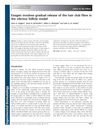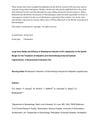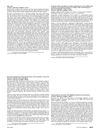The prostamide‐related glaucoma therapy, bimatoprost, offers a novel approach for treating scalp alopecias
October 2012
in “The FASEB Journal”

TLDR Bimatoprost, a glaucoma medication, may also help treat hair loss.
The 2012 study investigated bimatoprost, a prostamide F2α analog used in glaucoma therapy, for its potential to treat scalp alopecias. It was found to stimulate hair growth in human scalp follicles in culture and in mice in vivo. Bimatoprost increased hair synthesis, prolonged the anagen phase, and advanced hair regrowth, with effects being receptor-mediated as confirmed by the blocking action of a prostamide receptor antagonist. Human scalp follicles were shown to express prostanoid receptor genes, indicating a potential for response to bimatoprost treatment. The study involved human scalp samples from 15 men and 2 women, molecular biological investigations of samples from 7 men and 1 woman, and immunohistochemical investigations involving 3 men and 2 women. Additionally, at least 6 hair follicles from each individual were used for each condition in the culture experiments, and the mouse study showed a significant reduction in the time to enter the anagen phase with bimatoprost treatment. The study concluded that bimatoprost could be a novel, low-risk therapeutic approach for treating scalp alopecias.
View this study on onlinelibrary.wiley.com →
Cited in this study

research Physiological Regeneration of Skin Appendages and Implications for Regenerative Medicine
The document concludes that understanding hair and feather regeneration can help develop new regenerative medicine strategies.

research Self-Organizing and Stochastic Behaviors During the Regeneration of Hair Stem Cells
Hair stem cell regeneration is controlled by signals that can explain different hair growth patterns and baldness.
research Characterization of anin vivomodel for the study of eyelash biology and trichomegaly: mouse eyelash morphology, development, growth cycle, and anagen prolongation by bimatoprost
The study showed that mouse eyelashes can be used to study eyelash growth and that bimatoprost makes them longer and more numerous.

research Exogen involves gradual release of the hair club fibre in the vibrissa follicle model
Hair sheds gradually from the follicle, with readiness to shed indicated by less attachment material.
research Alopecia Areata: Evidence-Based Treatments

research Medical treatments for male and female pattern hair loss
Minoxidil and finasteride treat hair loss in men, while minoxidil treats hair loss in women.

research Androgens and hair growth
Androgens can both increase and decrease hair growth in different parts of the body.

research Human hair follicles contain two forms of ATP‐ sensitive potassium channels, only one of which is sensitive to minoxidil
One minoxidil-sensitive potassium channel exists in human hair follicles.

research Complex Hair Cycle Domain Patterns and Regenerative Hair Waves in Living Rodents
Mice hair growth patterns get more complex with age and can change with events like pregnancy or injury.

research Stem cell factor/c-Kit signalling in normal and androgenetic alopecia hair follicles
SCF and c-Kit decrease in AGA hair follicles, possibly affecting hair pigmentation and growth.
research Prostanoid receptors in anagen human hair follicles
Human hair follicles contain a complex network of prostanoid receptors that may influence hair growth.

research Prostaglandin metabolism in human hair follicle
Human hair follicles can make and process prostaglandins, which may affect hair growth.

research Hormonal regulation of hair follicles exhibits a biological paradox
Androgens can both stimulate and cause hair loss, and understanding their effects is key to treating hair disorders.

research Drug-Induced Hair Disorders
Some drugs can cause hair loss, excessive growth, or color changes, often reversible but sometimes permanent.
research Molecular Dissection of Mesenchymal–Epithelial Interactions in the Hair Follicle
Understanding gene expression in hair follicles can reveal insights into hair growth and disorders.

research Minoxidil: mechanisms of action on hair growth
Minoxidil boosts hair growth by opening potassium channels and increasing cell activity.

research Identification of Androgen-Inducible TGF-β1 Derived from Dermal Papilla Cells as a Key Mediator in Androgenetic Alopecia
TGF-β1 from dermal papilla cells suppresses hair growth, and targeting it may help treat androgenetic alopecia.

research Finasteride in the treatment of men with androgenetic alopecia
Finasteride safely and effectively treats male pattern hair loss, but may cause reversible sexual issues and harm male fetuses.

research Effects of Self-Perceived Hair Loss in a Community Sample of Men
Men who think they are losing hair feel worse about themselves, especially if they are younger.

research Activation of Cytoprotective Prostaglandin Synthase-1 by Minoxidil as a Possible Explanation for Its Hair Growth-Stimulating Effect
Minoxidil boosts hair growth by activating PGHS-1.

research Psychological effects of androgenetic alopecia on women: Comparisons with balding men and with female control subjects
Hair loss affects women's mental health more than men's, causing anxiety, low self-esteem, and social insecurity.

research Diagnostic and predictive value of horizontal sections of scalp biopsy specimens in male pattern androgenetic alopecia
Horizontal scalp biopsy sections effectively diagnose and predict MPAA, with follicular density and inflammation impacting hair regrowth.
Related

research Therapeutic potential of bimatoprost for the treatment of eyebrow hypotrichosis
Bimatoprost is safe and effective for improving eyebrow hair.

research Bimatoprost solution 0·03% topical application to the eyelid margin for the treatment of eyelash hypotrichosis
Bimatoprost solution 0.03% is effective for treating sparse eyelashes.

research Long‐term safety and efficacy of bimatoprost solution 0·03% application to the eyelid margin for the treatment of idiopathic and chemotherapy‐induced eyelash hypotrichosis: a randomized controlled trial
Bimatoprost solution is effective and safe for long-term use in treating eyelash thinning.

research The prostamide‐related glaucoma therapy, bimatoprost, offers a novel approach for treating scalp alopecias
Bimatoprost, a glaucoma medication, may also help treat hair loss.

research Long-term safety and efficacy of Latisse (bimatoprost 0.03% solution) for treatment of eyelash hypotrichosis in subjects with chemotherapy induced and idiopathic hypotrichosis
Latisse is safe and effective for long-term eyelash growth in people with thin eyelashes from chemotherapy or unknown causes.
research Topical bimatoprost for the treatment of eyebrow hypotrichosis.
Bimatoprost can help grow eyebrow hair.
research Bimatoprost in the treatment of eyelash hypotrichosis
Bimatoprost is effective for growing longer, thicker, and darker eyelashes.